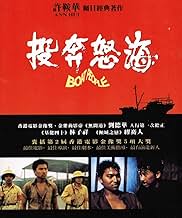A Japanese photojournalist revisits Vietnam after the Liberation and learns harsh truths about its regime and its "New Economic Zones".A Japanese photojournalist revisits Vietnam after the Liberation and learns harsh truths about its regime and its "New Economic Zones".A Japanese photojournalist revisits Vietnam after the Liberation and learns harsh truths about its regime and its "New Economic Zones".
- Awards
- 6 wins & 7 nominations
- Shiomi Akutagawa
- (as George Chi-Cheung Lam)
- Nguyen's Mistress
- (as Cora Chien-Jen Miao)
- Le Van Quyen
- (as Mei-Ying Jia)
- Comrade Vu
- (as Shu-Jin Lin)
- Director
- Writers
- All cast & crew
- Production, box office & more at IMDbPro
Storyline
Did you know
- TriviaThe People's Republic of China, just ending a war with Vietnam, gave Hui permission to film on Hainan Island. Boat People was the first Hong Kong movie filmed in Communist China.
- GoofsAt the dinner a waiter pours a beer for the journalist with a head of 3-4 cm. After the cut to another angle, only 1 cm is left.
- Quotes
Comrade Nguyen: They're too young, Comrade Le and Comrade Vu. They're too eager. They lose proportion. When I see how determined they are... I think I must have been weak when I was young. It makes me feel old.
Shiomi Akutagawa: You aren't old.
Comrade Nguyen: Recently I've been thinking a lot about my youth... here and Paris, drinking French wine, eating French food... even longing for a French woman. I must be old! The Revolution claimed half of my life. And now I realized I'm old. My mind still lives in the colonial past. Vietnam has won her Revolution. But I've lost mine! I know where to get the best French food in Danang. I'll take you there sometime.
- ConnectionsFeatured in Keep Rolling (2020)
There are many deaths in this film and the majority of these deaths are graphically depicted. One of the least explicit, but perhaps the most moving, occurs on a scrap heap surrounded by a body of filthy water. While the young victim's blood is still flowing out, his peer runs the length of the heap bearing a standard, his identity and the colours of the flag rendered anonymous by the remote camera angle and the silhouette produced by the setting sun. The boy lays the flag over the body with a timeliness and purpose that implies he is always ready for such tragedies. It is one of the film's most striking images, calling to mind such questionable iconic images as the flag-raisers of Iwo Jima.
Such readings are possible over much of the film. Director Ann Hui's 'vérité' camera calls to mind Altman's M*A*S*H, as does her treatment of violence and its bloody consequences - something which contrasts with the comic book violence of later 80s Hong Kong films (with which many people are more familiar). Comparisons could also be made with Kubrick's use of zoom (though M*A*S*H has this too) and formal composition, with characters placed in the centre of frame as if being interviewed for live television. Kubrick, of course, would later direct his own Vietnam masterpiece, Full Metal Jacket.
Comparisons could even be made with Francis Ford Coppola's Apocalypse Now. Coppola's helicopter sequence filmed in the Philippines shares a lot with Hui's remarkable opening shot of tanks driving through the streets of Hainan, China (both standing in for Vietnam). However, where Coppola tended towards using the imagery of Vietnam to attain a greater artistic goal, Hui would be discredited for receiving any such reading. Where the sound of Coppola's napalm explosions bring a certain excitement and satisfaction to the viewer, the gunshots heralding executions and the chance for children to pillage the corpses has an entirely different motive and effect.
One of the film's strengths is that, while it plays with, even exploits some well-established grammars of film making - tragedy, documentary, romance - it never defers to a single one. The film works on each level equally well. It is a well-told story: excellently paced and genuinely compelling right up to the end credits. At the other end of the spectrum, it is perhaps the boldest and most unflinching criticism of the brutality and hypocrisy of communist states to come out of a small island that would, 17 years later, become a Special Administrative Region of such a state.
The film has elements of curiosity. One can accept for purely practical reasons the need for Cantonese to be the common language of Vietnamese and Japanese characters. It is harder to understand why a Japanese man (played by a local Hong Kong actor) should be the main protagonist, especially considering the film's political overtones. Does he represent objectiveness or irony? Perhaps there is no single answer.
Despite some minor flaws, the film manages to illustrate without preaching, condescending or even aestheticising the subject, even though the dimly-lit tableaux and pitch-perfect editing combine very pleasingly for the eye. Hui works with a lightness of touch rarely seen in Hong Kong or Hollywood at that time or since and with a feminist subtext scarcely seen in her later work. This film well-deserves the acclaim with which it was awarded on its release and is sadly underrated at the time of writing. It serves as an interesting and important counterpoint to the various lavish 'magnum opuses' of American directors of that era and has an enduring relevance and importance that many young people, especially of the film's native land, would benefit from experiencing.
- sccoverton
- Dec 7, 2008
- Permalink
- How long is Boat People?Powered by Alexa
Details
Box office
- Gross worldwide
- HK$15,475,087
Contribute to this page























